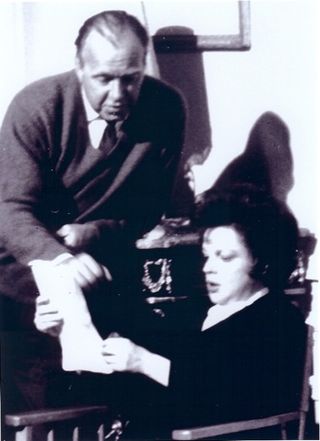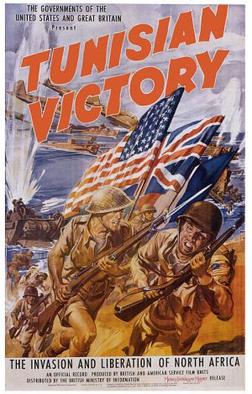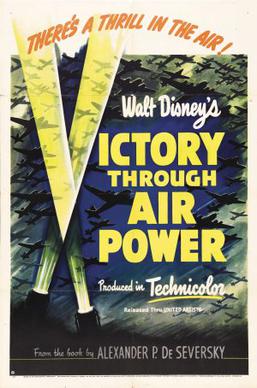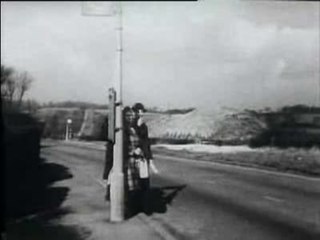Related Research Articles

Triumph of the Will is a 1935 German Nazi propaganda film directed, produced, edited and co-written by Leni Riefenstahl. Adolf Hitler commissioned the film and served as an unofficial executive producer; his name appears in the opening titles. It chronicles the 1934 Nazi Party Congress in Nuremberg, which was attended by more than 700,000 Nazi supporters. The film contains excerpts of speeches given by Nazi leaders at the Congress, including Hitler, Rudolf Hess and Julius Streicher, interspersed with footage of massed Sturmabteilung (SA) and Schutzstaffel (SS) troops and public reaction. Its overriding theme is the return of Germany as a great power with Hitler as its leader. The film was produced after the Night of the Long Knives and many formerly prominent SA members are absent.

War film is a film genre concerned with warfare, typically about naval, air, or land battles, with combat scenes central to the drama. It has been strongly associated with the 20th century. The fateful nature of battle scenes means that war films often end with them. Themes explored include combat, survival and escape, camaraderie between soldiers, sacrifice, the futility and inhumanity of battle, the effects of war on society, and the moral and human issues raised by war. War films are often categorized by their milieu, such as the Korean War; the most popular subject is the Second World War. The stories told may be fiction, historical drama, or biographical. Critics have noted similarities between the Western and the war film.

Why We Fight is a series of seven propaganda films produced by the US Department of War from 1942 to 1945, during World War II. It was originally written for American soldiers to help them understand why the United States was involved in the war, but US President Franklin Roosevelt ordered distribution for public viewing.
This is a list of films by year that have received an Academy Award together with the other nominations for best documentary short film. Following the Academy's practice, the year listed for each film is the year of release: the awards are announced and presented early in the following year. Copies of every winning film are held by the Academy Film Archive. Ten films are shortlisted before nominations are announced.

Glory is a 1989 American historical war drama film directed by Edward Zwick about the 54th Massachusetts Infantry Regiment, one of the Union Army's earliest African-American regiments in the American Civil War. It stars Matthew Broderick as Colonel Robert Gould Shaw, the regiment's commanding officer, and Denzel Washington, Cary Elwes, and Morgan Freeman as fictional members of the 54th. The screenplay by Kevin Jarre was based on the books Lay This Laurel (1973) by Lincoln Kirstein and One Gallant Rush (1965) by Peter Burchard and the personal letters of Shaw. The film depicts the soldiers of the 54th from the formation of their regiment to their heroic actions at the Second Battle of Fort Wagner.

Ronald Neame CBE, BSC was an English film producer, director, cinematographer, and screenwriter. Beginning his career as a cinematographer, for his work on the British war film One of Our Aircraft Is Missing (1943) he received an Academy Award nomination for Best Special Effects. During a partnership with director David Lean, he produced Brief Encounter (1945), Great Expectations (1946), and Oliver Twist (1948), receiving two Academy Award nominations for writing.

The Battle of Russia (1943) is the fifth film of Frank Capra's Why We Fight documentary series. The longest film of the series, it has two parts. It was made in collaboration with Russian-born Anatole Litvak as primary director under Capra's supervision. Litvak gave the film its "shape and orientation," and the film had seven writers with voice narration by Walter Huston. The score was done by the Russian-born Hollywood composer Dimitri Tiomkin and drew heavily on Tchaikovsky along with traditional Russian folk songs and ballads.

The Psychological Warfare Division of Supreme Headquarters Allied Expeditionary Force was a joint Anglo-American organization set-up in World War II tasked with conducting (predominantly) white tactical psychological warfare against German troops and recently liberated countries in Northwest Europe, during and after D-Day. It was headed by US Brigadier-General Robert A. McClure. The Division was formed from staff of the US Office of War Information (OWI) and Office of Strategic Services (OSS) and the British Political Warfare Executive (PWE).

Tunisian Victory is a 1944 Anglo-American propaganda film about the victories in the North Africa Campaign.

Churchill's Island is a 1941 propaganda film chronicling the defence of Britain during the Second World War. The film was directed by Stuart Legg and produced by the National Film Board of Canada (NFB) for the Director of Information, Government of Canada.

Theresienstadt. Ein Dokumentarfilm aus dem jüdischen Siedlungsgebiet, unofficially Der Führer schenkt den Juden eine Stadt, was a black-and-white projected Nazi propaganda film. It was directed by the German Jewish prisoner Kurt Gerron and the Czech filmmaker Karel Pečený under close SS supervision in the Theresienstadt concentration camp, and edited by Pečený's company, Aktualita. Filmed mostly in the autumn of 1944, it was completed on 28 March 1945 and screened privately four times. After the war, the film was lost but about twenty minutes of footage was later rediscovered in various archives.
London Can Take It! is a short British propaganda film from 1940, which shows the effects of eighteen hours of the German blitz on London and its people. Intended to sway the US population in favour of Britain's plight, it was produced by the GPO Film Unit for the British Ministry of Information and distributed throughout the United States by Warner Bros. The film was directed by Humphrey Jennings and Harry Watt, and narrated by US war correspondent Quentin Reynolds.

Listen to Britain is a 1942 British propaganda short film by Humphrey Jennings and Stewart McAllister. The film was produced during World War II by the Crown Film Unit, an organisation within the British Government's Ministry of Information to support the Allied war effort. The film was nominated for the inaugural Academy Award for Best Documentary Feature in 1943, but lost against four other Allied propaganda films. It is noted for its nonlinear structure and its use of sound.
Christmas Under Fire is a 1941 British short documentary film directed by Harry Watt for the Crown Film Unit of the Ministry of Information. It was conceived as propaganda primarily for an American audience, to raise support for the Allied cause during the Second World War. Produced in the context of German bombings of British cities, it depicts the resilience of British civilians despite the hardships they suffered during Christmas 1940, by showing the continuation of Christmas traditions in the face of the disruptions caused by war. The film is a sequel to London Can Take It!, with the same narrator, Quentin Reynolds. It was nominated for an Academy Award for Best Documentary Short, which was won by Churchill's Island.

Victory Through Air Power is a 1943 American Technicolor animated documentary propaganda film produced by Walt Disney Productions and released by United Artists on July 17, 1943. It is based on the 1942 book Victory Through Air Power by Alexander P. de Seversky. De Seversky appeared in the film, an unusual departure from the Disney animated feature films of the time.
Anthony Veiller was an American screenwriter and film producer. He wrote for 41 films between 1934 and 1964.
Dallas Bower was a British director and producer active during the early development of mass media communication. Throughout his career Bower’s work spanned radio plays, television shows, propaganda shorts, animations and feature films, with his most notable projects consisting of Alfred Hitchcock’s first film in sound Blackmail (1929), the British Broadcasting Company’s radio play Julius Caesar (1938), the Dunkirk evacuation propaganda short Channel Incident (1940), the feature film Henry V (1944), and an Anglo-French adaptation of Lewis Carroll's children's novel Alice's Adventures in Wonderland entitled Alice au pays des merveilles (1949). He later produced some of the earliest British television commercials.
German Concentration Camps Factual Survey is the official British documentary film on the Nazi concentration camps, based on footage shot by the Allied forces in 1945.

Five Came Back is an American documentary based on the 2014 book Five Came Back: A Story of Hollywood and the Second World War by journalist Mark Harris. It was released as a stand-alone documentary in New York and Los Angeles, and as a three-part series on Netflix, on March 31, 2017.

The Colonial Film Unit (C.F.U) was a propaganda and educational film production organization of the British government. It produced films for various British colonies including British Guiana and Nigeria. The Jamaica Film Unit was a division for films produced in Jamaica. The Colonial Film Unit was established in 1939 and produced 200 films before being shut down in 1955. It was part of Britain's Ministry of Information. It produced a magazine titled Colonial Cinema. Training filmmakers was also an important part of the unit's activities.
References
- ↑ "The 18th Academy Awards (1946) Nominees and Winners". oscars.org. Retrieved 29 May 2019.
- ↑ None credited, THE TRUE GLORY restored., UK Ministry of Information & US Office of War Information, retrieved 17 March 2020
- ↑ Bonner-Smith, D. (1950). "Drake's Prayer". The Mariner's Mirror. 36: 86–87. doi:10.1080/00253359.1950.10657582.